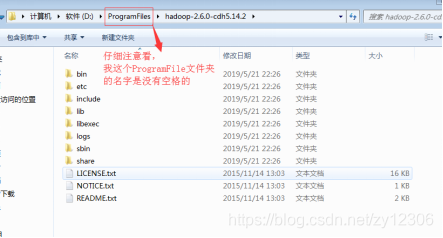大数据-HDFS(三)
HDFS 的 java API 开发
第一步:配置Windows的 hadoop 环境变量
1、解压资料当中的 hadoop-2.6.0-cdh5.14.2_windows环境配置安装包.rar 这个压缩文件文件到一个没有中文没有空格的目录下

2、然后在windows当中配置hadoop的环境变量

3、然后将hadoop.dll文件拷贝到C:\Windows\System32

注意:如果没有 配置好windows的hadoop的环境变量,那么就会报以下错误

第二步:创建maven工程并导入jar包
由于cdh版本的所有的软件涉及版权的问题,所以并没有将所有的jar包托管到maven仓库当中去,而是托管在了CDH自己的服务器上面,所以我们默认去maven的仓库下载不到,需要自己手动的添加repository去CDH仓库进行下载,以下两个地址是官方文档说明,请仔细查阅
https://www.cloudera.com/documentation/enterprise/release-notes/topics/cdh_vd_cdh5_maven_repo.html
<repositories>
<repository>
<id>cloudera</id>
<url>https://repository.cloudera.com/artifactory/cloudera-repos/</url>
</repository>
</repositories>
<dependencies>
<dependency>
<groupId>org.apache.hadoop</groupId>
<artifactId>hadoop-client</artifactId>
<version>2.6.0-mr1-cdh5.14.2</version>
</dependency>
<dependency>
<groupId>org.apache.hadoop</groupId>
<artifactId>hadoop-common</artifactId>
<version>2.6.0-cdh5.14.2</version>
</dependency>
<dependency>
<groupId>org.apache.hadoop</groupId>
<artifactId>hadoop-hdfs</artifactId>
<version>2.6.0-cdh5.14.2</version>
</dependency>
<dependency>
<groupId>org.apache.hadoop</groupId>
<artifactId>hadoop-mapreduce-client-core</artifactId>
<version>2.6.0-cdh5.14.2</version>
</dependency>
<!-- https://mvnrepository.com/artifact/junit/junit -->
<dependency>
<groupId>junit</groupId>
<artifactId>junit</artifactId>
<version>4.11</version>
<scope>test</scope>
</dependency>
<dependency>
<groupId>org.testng</groupId>
<artifactId>testng</artifactId>
<version>RELEASE</version>
</dependency>
</dependencies>
<build>
<plugins>
<plugin>
<groupId>org.apache.maven.plugins</groupId>
<artifactId>maven-compiler-plugin</artifactId>
<version>3.0</version>
<configuration>
<source>1.8</source>
<target>1.8</target>
<encoding>UTF-8</encoding>
<!-- <verbal>true</verbal>-->
</configuration>
</plugin>
<plugin>
<groupId>org.apache.maven.plugins</groupId>
<artifactId>maven-shade-plugin</artifactId>
<version>2.4.3</version>
<executions>
<execution>
<phase>package</phase>
<goals>
<goal>shade</goal>
</goals>
<configuration>
<minimizeJar>true</minimizeJar>
</configuration>
</execution>
</executions>
</plugin>
</plugins>
</build>
第三步:开发hdfs的javaAPI操作
1、创建文件夹
@Test
public void mkdirToHdfs() throws IOException {
Configuration configuration = new Configuration();
configuration.set("fs.defaultFS","hdfs://node01:8020");
FileSystem fileSystem = FileSystem.get(configuration);
fileSystem.mkdirs(new Path("/kaikeba/dir1"));
fileSystem.close();
}
2、文件上传
@Test
public void uploadFile() throws IOException {
Configuration configuration = new Configuration();
configuration.set("fs.defaultFS","hdfs://node01:8020");
FileSystem fileSystem = FileSystem.get(configuration);
fileSystem.copyFromLocalFile(new Path("file:///d:\\hello.txt") , new
Path("hdfs://node01:8020/kaikeba/dir1"));
fileSystem.close();
}
3、文件下载
@Test
public void downloadFile() throws IOException {
Configuration configuration = new Configuration();
configuration.set("fs.defaultFS","hdfs://node01:8020");
FileSystem fileSystem = FileSystem.get(configuration);
fileSystem.copyToLocalFile(new Path("hdfs://node01:8020/kaikeba/dir1/hello.txt"),new
Path("file:///d:\\hello2.txt"));
fileSystem.close();
}
4、自主完成hdfs文件删除操作
5、自主完成hdfs文件重命名操作
6、查看hdfs文件相信信息
@Test
public void testListFiles() throws IOException, InterruptedException, URISyntaxException{
// 1获取文件系统
Configuration configuration = new Configuration();
FileSystem fs = FileSystem.get(new URI("hdfs://node01:8020"), configuration);
// 2 获取文件详情
RemoteIterator<LocatedFileStatus> listFiles = fs.listFiles(new Path("/"), true);
while(listFiles.hasNext()){
LocatedFileStatus status = listFiles.next();
// 输出详情
// 文件名称
System.out.println(status.getPath().getName());
// 长度
System.out.println(status.getLen());
// 权限
System.out.println(status.getPermission());
// 分组
System.out.println(status.getGroup());
// 获取存储的块信息
BlockLocation[] blockLocations = status.getBlockLocations();
for (BlockLocation blockLocation : blockLocations) {
// 获取块存储的主机节点
String[] hosts = blockLocation.getHosts();
for (String host : hosts) {
System.out.println(host);
}
}
}
// 3 关闭资源
fs.close();
}
hdfs 的 javaAPI 操作延伸阅读之通过IO流操作 hdfs 上面的文件
1、通过io流进行数据上传操作
@Test
public void putFileToHDFS() throws IOException, InterruptedException, URISyntaxException {
// 1 获取文件系统
Configuration configuration = new Configuration();
FileSystem fs = FileSystem.get(new URI("hdfs://node01:8020"), configuration);
// 2 创建输入流
FileInputStream fis = new FileInputStream(new File("file:///e:\\helo.txt"));
// 3 获取输出流
FSDataOutputStream fos = fs.create(new Path("hdfs://node01:8020/outresult.txt"));
// 4 流对拷
IOUtils.copy(fis, fos);
// 5 关闭资源
IOUtils.closeQuietly(fos);
IOUtils.closeQuietly(fis);
fs.close();
}
2、自主实现通过IO流从hdfs上面下载文件
3、hdfs的小文件合并
/**
* 小文件合并
*/
@Test
public void mergeFile() throws URISyntaxException, IOException, InterruptedException {
//获取分布式文件系统hdfs
FileSystem fileSystem = FileSystem.get(new URI("hdfs://node01:8020"), new
Configuration(), "hadoop");
FSDataOutputStream fsDataOutputStream = fileSystem.create(new
Path("hdfs://node01:8020/bigfile.xml"));
//获取本地文件系统 localFileSystem
LocalFileSystem localFileSystem = FileSystem.getLocal(new Configuration());
//读取本地的文件
FileStatus[] fileStatuses = localFileSystem.listStatus(new Path("file:///D:\\开课吧课程资料\\Hadoop&ZooKeeper课件\\最新版本课件\\hadoop与zookeeper课件资料\\1、第一天\\小文件合并"));
for (FileStatus fileStatus : fileStatuses) {
//获取每一个本地的文件路径
Path path = fileStatus.getPath();
//读取本地小文件
FSDataInputStream fsDataInputStream = localFileSystem.open(path);
IOUtils.copy(fsDataInputStream,fsDataOutputStream);
IOUtils.closeQuietly(fsDataInputStream);
}
IOUtils.closeQuietly(fsDataOutputStream);
localFileSystem.close();
fileSystem.close();
//读取所有本地小文件,写入到hdfs的大文件里面去
}
来源:CSDN
作者:海恋北斗星
链接:https://blog.csdn.net/zy12306/article/details/104307069